|
FAQs on Betta
Diseases/Health 32
Related Articles:
Anabantoids/Gouramis &
Relatives, Betta
splendens/Siamese Fighting Fish,
Betta Systems,
Betta Diseases,
Improved
(Better?) Products for Bettas!,
Related FAQs:
Betta Disease 1,
Betta Disease 2,
Betta Disease 3,
Betta Disease 4,
Betta Disease 5,
Betta Disease 6,
Betta Disease 7,
Betta Disease 8,
Betta Disease 9 ,
Betta Disease 10 ,
Betta Disease 11 ,
Betta Disease 12 ,
Betta Disease 13 ,
Betta Disease 14 ,
Betta Disease 15 ,
Betta Disease 16 ,
Betta Disease 17 ,
Betta Disease 18,
Betta Disease 19,
Betta Disease 20,
Betta Disease 21,
Betta Health 22,
Betta Health 23,
Betta Health 24,
Betta Health 25,
Betta Health 26, Betta Health 27,
Betta Health 28,
Betta Health 29,
Betta Health 30,
Betta Health 31,
Betta
Health 33, Betta Health 34,
Betta Health 35,
Betta Disease
Causes/Etiologies: Determining/Diagnosing,
Environmental (By far the largest cat.),
Nutritional,
Viral/Cancer,
Infectious (Bacterial, Fungal) ,
Parasitic:
Ich/White Spot,
Velvet;
Senescence/Old Age,
Cures/Curatives/Treatments,
FAQs on Betta Medicines:
Betta
Medicines period, Antibiotics/Antibacterials,
Anti-Protozoals (Metronidazole,
eSHa...), Copper,
Formalin,
Malachite Green,
Anthelminthics,
Organophosphates,
Salts,
All
Other Betta Med.s,
|
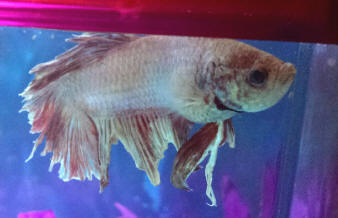
|
 |
Betta Success
Doing what it takes to keep Bettas healthy long-term
by Robert (Bob) Fenner
|
|
RE: Silver Dollar with single white spot on eye and hole in dorsal
Now; Betta damaged 8/14/16
Hi, Bob/Neale! Silver dollars all good now.
<Cool.>
However, my Betta male is now acting strangely: not eating and
alternating
between sitting on his leaf (normal spot) and sitting on the bottom of
the
tank. My parameters are the same as last I emailed you (see below) and I
did my regular 50% water change last Sunday. He has bright red blood (?)
on his lower fins.
<This is physical damage and incipient Finrot; identify the source of
the
damage and medicate appropriately. So far as source of damage goes, your
checklist includes aggression from other fish, being sucked into/onto a
filter, pushed against jagged/abrasive ornaments, and exposure to less
than
perfect water quality. On the medication front, something
tried-and-trusted
(i.e., antibiotics and Antibacterials) rather than tea-tree oils and
similar.>
No one is picking on him....I have watched and watched and I even placed
a
camera overnight to watch the silver dollars 2 nights. ...no aggression.
Please see pics...any suggestions? He's pretty special...a rescue from
LFS.
Thanks in advance! KRISTI
<Hope this helps, Neale.>
|
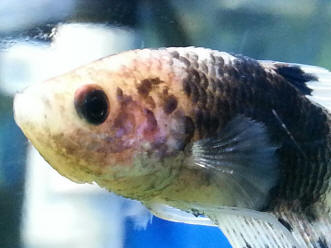
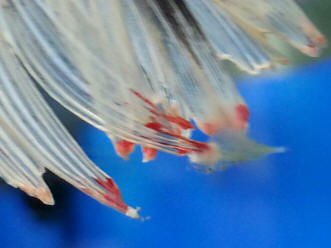 |
|
Cut/ gash in side of Betta fish Bob's try
8/9/16
Hi,
I wonder if you can offer any advice. About a week ago I noticed what
appeared to be a hole on the side of Sapphire, one of my female Betta's.
It looked like another fish had taken a bite of her.
<Certainly does look like a trauma... is there something sharp in this
tank?>
She was in a community tank which is usually peaceful. We had added some
Pakistani loaches that were new and I am wondering if one of them had
bit her.
<Possibly>
I have nothing sharp in the tank. I quarantined her and put some
Methylene blue in her tank and it appeared to be healing. I probably
moved her too soon and I put her in a female Betta only tank (Was
running out of plug sockets for heaters, filters etc). I have noticed it
now looks like a deep cut, her tummy looks a little bloated. I have put
her back in a tank on her own. Her stress lines are gone and she is
spending her time lying on a plant. She isn't eating. She is only little
and doesn't normally eat much. I have put Methylene blue in her tank. Is
there anything else I should be doing?
<Mmm; as reserved as I am regarding such, I might treat this fish with
an antibiotic (my choice either Kanamycin or a Furan compound); per the
recommended S.O.P. archived on WWM>
I don't want her to die but I don't want her to suffer either. I am
really hoping that she will heal. Thank you. Sammie
<Bettas are very tough... given good conditions and nutrition. Bob
Fenner>
Cut/ gash in side of Betta fish Neale's go
8/9/16
Hi,
I wonder if you can offer any advice. About a week ago I noticed what
appeared to be a hole on the side of Sapphire, one of my female Betta's.
It looked like another fish had taken a bite of her. She was in a
community tank which is usually peaceful. We had added some Pakistani
loaches that were new and I am wondering if one of them had bit her. I
have nothing sharp in the tank. I quarantined her and put some Methylene
blue in her tank and it appeared to be healing. I probably moved her too
soon and I put her in a female Betta only tank (Was running out of plug
sockets for heaters, filters etc). I have noticed it now looks like a
deep cut, her tummy looks a little bloated. I have put her back in a
tank on her own. Her stress lines are gone and she is spending her time
lying on a plant. She isn't eating. She is only little and doesn't
normally eat much. I have put Methylene blue in her tank. Is there
anything else I should be doing? I don't want her to die but I don't
want her to suffer either. I am really hoping that she will heal. Thank
you. Sammie
<Hello Sammie. Hard to say exactly what caused the gashes on your Betta.
Yes, it is possible the loaches are at fault, though it's unlikely they
actually bit her directly. What loaches are more prone to doing is
alarming placid fish, causing those fish to jump at the hood or into
rocks/ornaments, and thereby getting the poor fish damaged. Like carps,
loaches don't have teeth as such, instead possessing something called
pharyngeal teeth in their throats that are used to grind up the algae
and small invertebrates they consume. But what loaches do possess are
spines just below their eyes, used primarily for defence. Again, it's
unlikely loaches would use these as offensive weapons, but if the Betta
accidentally or otherwise got too close, it might get scratched. Bottom
line, loaches and Bettas make a poor choice of tankmates (with the
exception, perhaps, of Kuhli Loaches that should cohabit with Bettas
just fine). This is especially true in a smallish aquarium where the
Betta might find it hard to keep out of the way of the Yoyo / Pakistani
loach (Botia almorhae).
Anything less than, say, 30 gallons is going to be risky. In any event,
medicate as per Finrot (in the UK, I'd recommend eSHa 2000 as reliable
against bacterial infections) and don't forget to remove carbon, if
used, from the filter. Thus sort if damage usually heals well if
medicated promptly and the fish is kept in good water quality. Hope this
helps, Neale.>
|
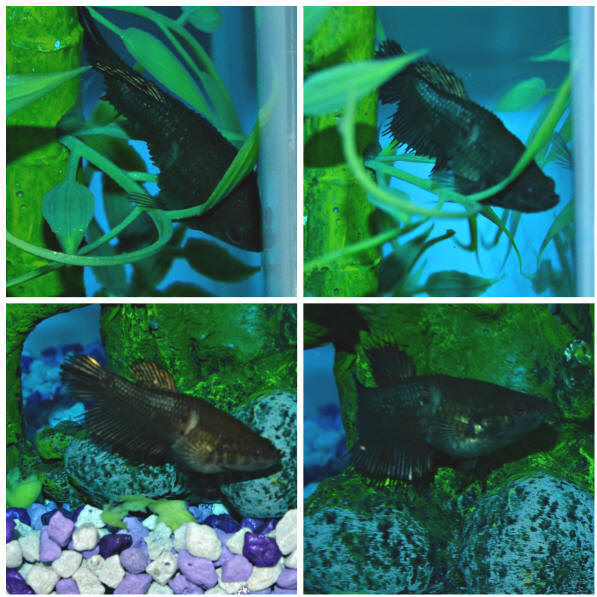 |
|
Re: Cut/ gash in side of Betta fish
8/9/16
Thank you for your quick reply. Unfortunately she passed away over
night.
<Ahh; BobF>
|
Sick Fish, need help
8/6/16
Hello,
<'Ello Elle>
I've had my Betta for the past year and up until a week ago, he was
energetic and healthy. Last Friday morning, I noticed that he was lying
on the bottom of his tank on his side but I didn't think anything of it.
However when I got home after work, I realized he was still lying on his
side. Over this past week, he's been lying on his side, will not
eat, and swimming up to the surface for 5-7 seconds to breathe.
<Bad.... environmental likely... but what?>
He has a solid white spot in the center of his eyes that hasn't grown
since I saw it last week.
<Either a trauma or env...>
During this past week, I've given him Daphnia for constipation,
Bettafix, done a 50% water change and a full water change in case it was
an ammonia issue, along with changing filter pads. His tank is a
2.5 gallon with a filter, heater, and water between 76-82 degrees.
<Should be steadier than this... in the low 80's F side>
Is he just getting old and doesn't have much life left or is there
something wrong with him?
<Do you have test kits for pH, NH3, NO2, NO3?>
Thanks,
Elle
<Welcome. Bob Fenner>
|
Betta eating tail fin?
7/20/16
Hi,
I have a Betta, Finn, in a 10 gallon heated, filtered, partially planted
tank, by himself. I have had Finn since Saturday. I think he is a Crowntail.
I noticed today that the top part of his tail fin looked shorter than when I
got him, but the rest of his fins look great, he explores his tank
constantly.
<The tail is damaged... from what? What other livestock is in this system?>
I haven't him eat yet, but he showed a little interest in Betta pellets I
put in the tank. Should I step up water changes to every week instead of
every two and that will take care of it, or is this possibly the beginning
of something and I should get medicine?
<I would treat as per Finrot. Please read here re:
http://www.wetwebmedia.com/fwsubwebindex/FWFinRot.htm
Thank you! Heather
Here he is:
<Well; Betta's will chase their own tails, and some can/do rot off if
physically damaged... but, this occurred so quickly... am thinking some
other organism is involved. Bob Fenner>
Betta eating tail fin? Neale's alternative
7/21/16
Hi,
I have a Betta, Finn, in a 10 gallon heated, filtered, partially planted tank,
by himself.
<Nice! Can I congratulate you on keeping this chap so well.>
I have had Finn since Saturday. I think he is a Crowntail. I noticed today that
the top part of his tail fin looked shorter than when I got him, but the rest of
his fins look great, he explores his tank constantly.
<Cool. Given space these fish are very interesting (and interested) animals.>
I haven't him eat yet, but he showed a little interest in Betta pellets I put in
the tank.
<If he's new to the tank, it may take a few days to settle in. Don't bother
feeding him if that's the case, and remove uneaten food. But if he's been in the
tank a couple days, then there may be an issue. Am I correct in suggesting the
tail fin has become raggedy? That can mean two things. First option, he's
getting trapped on an over-strong filter. As he pulls away from the filter inlet
his fins get torn. Turning the filter power right down can help. Air-powered
filters are best for Bettas and generally work fine without fuss. But if this is
a small internal canister filter or hang-on-the-back filter, then turning down
the suction will be required because these suck rather too hard for Bettas. If
you can't tweak the flow rate, it might be possible to jury-rig some sort of
plastic mesh an inch or so away the filter inlet to keep the Betta from getting
too close. Second option is Finrot, usually associated with water quality. If
ammonia or nitrite aren't zero, there's a high risk of Finrot. Finrot typically
results in white or pink patches on the raggedy fins as evidence of dead tissue
and inflamed blood vessels. Medicate as per Finrot using commercial medications,
but also do daily water changes (before adding that day's medicine) of around
25%. Don't feed while ammonia or nitrite aren't zero.
It takes about 6 weeks to cycle a brand new filter. In 10 gallons your Betta
should sail through the cycling process, but you will need to do regular water
changes. I'd suggest 25% water changes every day for the first couple weeks,
then every couple days thereafter.>
Should I step up water changes to every week instead of every two and that will
take care of it, or is this possibly the beginning of something and I should get
medicine?
<See above; if Finrot, medicate; if not Finrot, then frequent water
changes should fix things, and the fins will heal naturally.>
Thank you! Heather
<Welcome, Neale.>
|
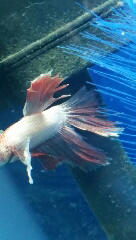
|
Re: Betta eating tail fin? 7/21/16
Hi Bob, thanks for responding so quickly. Finn is in the tank by himself
with some silk plants.
<Ahh: I see>
Is it possible he already had the Finrot when I bought him?
<Yes; this is the most likely...>
This is a still image of what he looked like when I brought him home:
<Very nice>
Thank you, Heather
<Welcome! BobF>
|
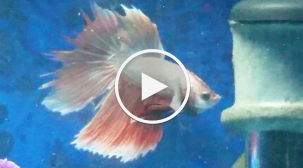 |
|
Splitting Betta Ian's
go 7/16/16
Dear Wet Web,
You had a post in 2008 about a Betta who split open, but Sabrina, who answered
the question, was not familiar with this problem. My Betta, who is three years
old, suddenly became very swollen about two weeks ago. All his scales were
sticking out from his skin. Naturally, I thought it was the end of Holmes and
considered euthanizing him, but did not know how to go about it. Also, he
continued to eat, which I thought a sign that he was not desperate to be out of
pain. Where he burst open, very pale flesh protruded--about half a pea's size of
white matter--and a few pinkish wormlike things were produced in the following
week, but I was unsure whether they were dead worms or feces. Certainly they
were not living when they were produced. At any rate, I have continued to
observe and wait.
Gradually, the protruding matter has diminished in size, and Holmes' scales
flattened again. He continues to eat well. He almost looks like his old self!
What do you make of it?
< Ian here today. Mm. This is quite perplexing. I would have recommended
immediate euthanasia if the Betta's
abdomen split open. With the scales folding back it sounded like dropsy ,
another ailment I would have recommended euthanasia for as well. Hmm. And he has
sealed himself back up and healed and folding his scales back down?
What is your set up like size wise with any decor or substrate? Tankmates? Food?
Water parameters? I apologize for all the questions but this is so unusual for a
fish, let alone a small fish like a Betta to recover and I am quite curious as
to what helped him. I would recommend treating for internal parasites to prevent
such an incident from happening again as from what I am hearing those were
worms. Wishing your Betta a speedy recovery.
~Ian>
Splitting Betta Bob's try
7/16/16
Dear Wet Web,
<Caroline>
You had a post in 2008 about a Betta who split open, but Sabrina, who answered
the question, was not familiar with this problem. My Betta, who is three years
old, suddenly became very swollen about two weeks ago.
<Mmm; "dropsy" or dropsical conditions have "strange etiologies" as in unknown
causes... Some folks claim they're primary or secondarily bacterial; w/
environmental mal-influences of various sorts contributing. >
All his scales were sticking out from his skin.
<Oh! A classical condition. Please read here re:
http://www.wetwebmedia.com/fwsubwebindex/dropsyfaqs.htm
Naturally, I thought it was the end of Holmes and considered euthanizing him,
but did not know how to go about it.
<This is covered on WWM as well... the search tool, Neale's article... likely
Clove oil>
Also, he continued to eat, which I thought a sign that he was not desperate to
be out of pain. Where he burst open, very pale flesh protruded--about half a
pea's size of white matter--and a few pinkish wormlike things were produced in
the following week, but I was unsure whether they were dead worms or feces.
<Do you have a hand loupe? I'd take a closer look>
Certainly they were not living when they were produced. At any rate, I have
continued to observe and wait. Gradually, the protruding matter has diminished
in size, and Holmes' scales flattened again. He continues to eat well. He almost
looks like his old self! What do you make of it?
<Can't tell from here; but as stated... Well, do the reading and you tell
me/us.>
All best,
Caroline
<And you, Bob Fenner>
|
Beta fins 7/1/16
<...1.4 megs....>
I have 3 beta fish in an Aqueon waterfall aquarium.
<Male Betta's don't live communally; nor in continuous view of each
other>
My beta fish have adjusted to the flowing water, all of them except my
rose petal fish. He has in a way adjusted to it, but I'm very worried
about him, because I saw this(look at picture attached). A few of the
strands on his rear fin are
missing,
<Torn off>
when I purchased him this wasn't there, and I've had him for 2-3 months
now. I saw this yesterday I had turned off the filter for a few days and
1 day he was fine and the next day I look at him and he's like this, all
of this happened when the filter was turned off. All three beta fish are
separated. What happened to him?
<... as stated. READ here:
http://www.wetwebmedia.com/fwsubwebindex/bettasysart.htm
and the linked files above. Bob Fenner>
|
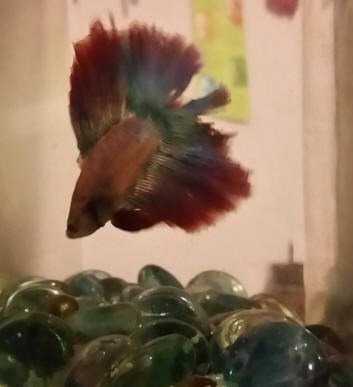 Looks
like trauma to me. Looks
like trauma to me. |
|
Beta fins /Neale
7/2/16
I have 3 beta fish in an Aqueon waterfall aquarium.
<Two gallons for three Bettas? Would need to know about water quality before
discounting Finrot, the usual cause for raggedy fins once you
discount physical damage. It's a clever aquarium design for sure, but
whether it works as good as it looks is unknown to me. I'd need proof in the
form of, at minimum, a nitrite test result. I'm also staggered
something sold for Bettas doesn't have a heater. That's insane!
These are tropical fish that will die at room temperatures (unless of course
your room is a constant 25C/77F or warmer!). It sucks that companies that
should know better are misleading inexperienced fishkeepers into thinking
Bettas don't need a heater. That'd be like telling someone a dog doesn't
need walks! So I assume you've installed a heater, otherwise environmental
stress and consequent Finrot are extremely likely. For sure this fish is
sick before the others, but any Betta kept at room temperature is a Betta
that's going to die sooner rather than later.>
My beta fish have adjusted to the flowing water, all of them except my rose
petal fish. He has in a way adjusted to it, but I'm very worried about him,
because I saw this (look at picture attached). A few of the strands on his
rear fin are missing, when I purchased him this wasn't there, and I've had
him for 2-3 months now. I saw this yesterday I had turned off the filter for
a few days and 1 day he was fine and the next day I look at him and he's
like this, all of this happened when the filter was turned off. All three
beta fish are separated. What happened to him?
<As Bob F. suggests, physical damage is one possibility. Bettas aren't
adapted to flowing currents. They come from ponds and ditches, and the
long-fin forms are artificial fish at that, selected for looks rather than
swimming ability. In tanks with currents they're easily "sucked" into inlets
or washed against rough objects by the current, and the result is
damage to their fins. The ideal system is something around 3-5 gallons per
Betta, with an air-powered sponge filter and a heater. Cheers, Neale.>
|
|
Sick Betta with swollen belly
6/20/16
Hello,
I have an older Betta, at least 3 years old now, that has a swollen belly.
From all that I've read I assume he is constipated with a possible
swim bladder issue?
<Mmm; most all such complaints are a matter of environmental and/or
nutritional issues>
He is in a 3 gallon tank with a filter and heater. I keep the temp around
79. The water quality was not the best for a few months
<Bingo>
when my Mom had to take care of him and his fins got a little beat up, but
that was a couple months ago, water is great now. I didn't know Bettas were
notorious for over eating, which I'm now guilty of the last couple
months.
<Ditto>
I normally feed Hikari Betta pellets, which I've now stopped. I added a
teaspoon of Epsom salt to his 3 gallon tank and will be offering peas over
the next week. I have a new Betta that will be arriving next week and
planned to set up my 6 gallon divided tank to put both of them in. )I had
this custom made for the 2) My question is, is it safe to put the old one
and new one in the same tank?
<No; see WWM, my book on Bettas re... Not okay for them to be in constant
vision of each other>
I assume from all that I've read that swim bladder problems are not
contagious since it's an organ problem?
<.... this condition is NOT a disease per se; but a symptom. Again due to
poor env./nutr.>
I obviously don't want to risk getting the new baby sick. Also, will the
Epsom salt in the water be ok for the new one, should you say it's ok to
house them together? I'm including a picture of my sick Betta. I've noticed
a slight swelling starting a couple months ago, but they swelling grew
pretty fast over the past few days which leads me to believe it's most
likely constipation combined with my overfeeding. I won't be making that
mistake again. In a couple of your articles you mentioned feeding some brine
shrimp, but there aren't any fish stores within about 15-20 miles of my
home, so I'm hoping peas for now is fine?
Thank you for your help,
Blaire
<Read on! Bob Fenner>
|
 |
Betta tank... Leaping....
6/11/16
Hi! My name is MaKayla and I have the Top Fin Aqua scene 2
gallon desktop aquarium starter kit and i bought it 2 days ago, set it
up, and let it settle for a day before I went and got my Betta fish the
next day (today)...long story short the tank is overproducing
very small bubbles that are sitting at the top of the tank...I already
tried filling the tank a bit more and it lessened the bubbles but not by
a fraction. Because of this my fish doesn't wanna swim up to the top of
the tank to breathe. Any advice??
<Yes! Kayla... this system wasn't, isn't ready for a Betta....
Please read here re:
http://www.wetwebmedia.com/fwsubwebindex/bettasysart.htm
I'd return this fish to the store for now... ask them to hold onto it
for you... otherwise it may die under present
circumstances. READ dear; and quick. Bob Fenner>
Re: Betta tank 6/11/16
But what is the problem with it?
<....? Read... the system isn't cycled. You're killing this fish. B>
Re: Betta tank 6/11/16
You sent me to a general link so I was confused ... but okay thanks
<Ahh; continue with the linked files at top. B>
Re: Betta tank /Thank you ever-patient Neale
6/11/16
You sent me to a general link so I was confused ... but okay thanks
<<The point Bob is making is that a new aquarium takes 6 weeks to mature
*before* you add any fish. The easiest way to do this is by adding
pinches of fish flake every few days, and as these rot they release
ammonia that feeds the bacteria that will be colonising the biological
filter. While it is possible to cycle an aquarium using actual fish
(this was the standard
approach right through until the 1990s) that does assume the tank is big
enough that the ammonia that accumulates won't reach a high enough
concentration to kill the hardy livestock (such as danios) chosen for
this process. Half a dozen danios in a 40-gallon tank aren't going to be
seriously stressed if you're doing substantial water changes every day
or
two. But a Betta in a two-gallon tank? Nope. The ammonia level will rise
so quickly that the poor fish will be stressed, if not outright killed.
Use an ammonia kit to measure the ammonia level, and anything above zero
is toxic enough to make them prone to diseases such as Finrot, and
anything above 0.5 mg/l can kill fish very quickly, with a day even.
Personally, I'd say any aquarium smaller than 4 gallons is a waste of
your money, if you are going to use a 2-gallon tank, at the very least
cycle it properly first, and then once you've seen the ammonia and
nitrite levels rise up and then drop down to zero, which takes about 6
weeks, only then are you good to go.
At the very least buy a nitrite test kit as this is probably the most
intuitive test kit: so long as nitrite is zero, your tank is working
fine (ammonia test kits can be misleading because it's possible to
detect neutralised ammonia in tap water after using the dechlorinator,
which makes identifying "harmful" ammonia from the fish difficult to
distinguish from the "safe" ammonia in the tap water). Sadly for Bettas,
they're super-popular with teens and students looking for small pets
they can keep in bedrooms and dorms, and such fishkeepers often have
very little idea about what they need. You'd be surprised how often Bob
and I handle questions from such people who have ended up with sick or
dying Bettas, often one or two such emails per day! If rehoming the
Betta for a few weeks isn't an option, at least buy a nitrite test kit,
don't add any food when there's a non-zero nitrite level, and do 50%
water changes every day or two. Ensure the filter is working properly
and don't over-clean the filter media (bear in mind it containing living
bacteria, so washing under a hot
tap for example will be a disaster). Ensure the heater is working
properly too, as Bettas won't live long at room temperature. Some folks
misunderstand the whole "Bettas live in jars" thing. Yes, breeders keep
them that way before selling them on -- but breeders keep them in heated
fish rooms (so don't use a heater in each jar) and change all the water
every day (which is why they don't use a filter). This approach requires
an insane amount of skill and time, which is why it can't be taken as a
template for the home aquarist. A reasonably big filtered, heated
aquarium is what you need! Do read the links Bob sent you to; he's an
expert
Betta-keeper, and there are VERY MANY similar situations to yours
described and explained in the linked FAQs. Cheers, Neale.>>
Betta tank 6/11/16
Hi! My name is MaKayla and I have the Top Fin Aqua scene 2 gallon
desktop aquarium starter kit
<This unit DOES NOT contain a heater... Bettas are *tropical*
fish... they will die at room temperature (outside of the
tropics, anyway).>
and i bought it 2 days ago, set it up, and let it settle for a day
before I went and got my Betta fish the next day (today)...
<Unfortunately this isn't how aquarium works. Unless you provide a
source of ammonia, "letting a tank settle" achieves precisely nothing
beyond demonstrate the tank isn't leaking! Can you return the Betta for
a few weeks? You need 4-6 weeks for a tank to properly mature, i.e., for
the biological filter to become properly active, assuming an input of
ammonia for the bacteria to use, such as small pinches of fish flake
every couple of days.>
long story short the tank is overproducing very small bubbles that are
sitting at the top of the tank...I already tried filling the tank a bit
more and it lessened the bubbles but not by a fraction. Because of this
my fish doesn't wanna swim up to the top of the tank to breathe. Any
advice??
<The bubbles are probably not a major issue, but can indicate a variety
of things. When cold tap water warms up bubbles of oxygen appear, as you
notice if you have a glass of water sitting by your bed overnight. Such
bubbles will eventually go away. Bubbles can also indicate
over-filtering, in which case dial back the flow rate a bit if possible.
Some tap water
contains gas under pressure, often CO2 in well water, and again, this
tends to fix itself over time, but will cause a dramatic pH change that
can stress your fish. I'm a bit more worried about the Betta being
inactive -- that usually means the Betta is stressed. Bear in mind it
MUST breathe air, and if it's choosing not to, that usually means it's
too cold (Betta
respiration rate decreases as they get colder, so the colder they are,
they less air they need) or else they're stressed (in which case they
try to slink away quietly somewhere safe). This Betta probably isn't
happy, so review the tank in the ways Bob and I have suggested, and act
accordingly.
At the moment he's merely unhappy; carry on like this and you'll see him
sicken and die. Act NOW. Cheers, Neale.>
Re: Betta tank 6/11/16
Okay thank you for the help
<Glad to help. Should have mentioned: a 25-watt heater is what you need
for an aquarium below 5 gallons in size. Cheers, Neale.>
 |
Betta Success
Doing what it takes to keep Bettas healthy long-term
by Robert (Bob) Fenner
|
|
|

